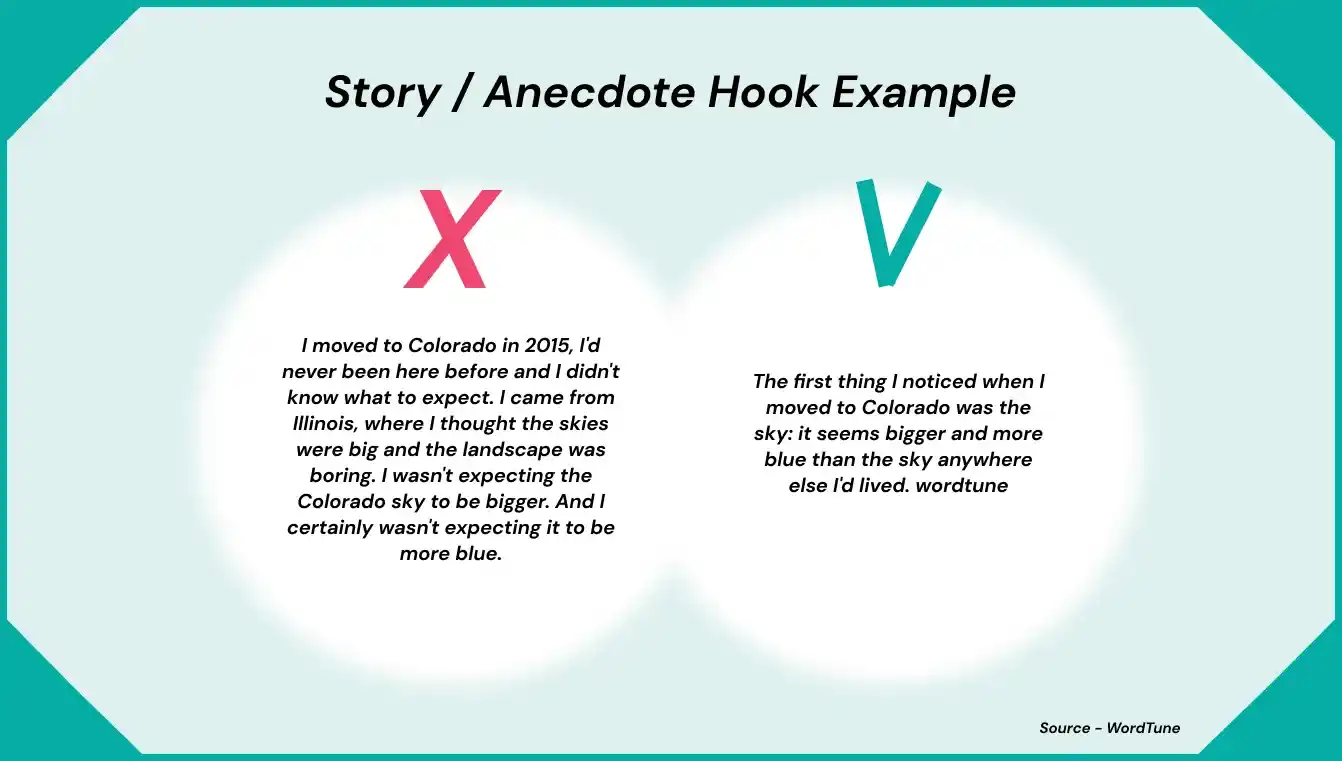In essay writing, an engaging introduction is like opening the door to your reader’s thoughts. This initial step, the “hook,” is a writer’s secret tool to grab attention. Here, we’ll show how to craft a hook for an essay using real examples, helping you understand how to write a hook for an essay.
Understanding the Essence of a Hook in Essays
So, how to write a hook for an essay? Crafting a compelling hook demands a toolbox of strategies. To begin, let’s consider some general principles. Firstly, a good hook should resonate with your essay’s theme and thesis statement, creating an instant connection with your audience. Here are four universal ways to craft compelling hooks:
- Pose a question. Engage your audience by posing a question that ignites their curiosity. This can be a thought-provoking query related to your essay’s subject.
Example: “Have you ever wondered about the untold stories hidden in the forgotten corners of our cities, waiting to be discovered?”
- Share an anecdote. Open with a personal story, such as an anecdote that draws readers into the heart of your narrative. It establishes a connection, making your essay relatable.
Example: “In the quiet alleys of my childhood hometown, I stumbled upon an old, dusty journal that held the secrets of generations past.”
- Use quotations. Include quotes from respected figures to add weight and authority to your essay. This works by captivating readers and infusing your work with external wisdom.
Example: “As the great Maya Angelou once said, ‘We all should know that diversity makes for a rich tapestry, and we must understand that all the threads of the tapestry are equal.'”
- Present a statistic. Numbers have a magnetic quality. Use statistics to underscore the importance of your essay’s topic, creating an immediate impact.
Example: “Every day, approximately 8 million tons of plastic find their way into our oceans, highlighting the urgent need for sustainable practices.”
Now, you know how to write a good hook for an essay!
Still stuck on your essay hook or feeling overwhelmed by the whole writing process? A custom writing service is the way to go. These services offer student-specific help to write engaging and well-structured essays. Whether it’s brainstorming ideas for a hook, developing a thesis or writing an entire intro, expert writers can help. By using their expertise you’ll make your essay stand out, grab the reader and meet the academic requirements. With personalized help you can focus on what matters most and get great results.
Five Types of Hooks for Various Essay Styles
Different essays require different hooks. Let’s explore five different types tailored to various essay styles:
- Narrative hook. How to start a hook for an essay? Begin with a compelling story, captivating readers in the narrative you’re about to unfold. For instance: “As the sun dipped below the horizon, painting the sky in hues of orange and pink, I found myself standing at the crossroads of destiny.”
- Argumentative essay hook. Spark debate with a provocative question or surprising fact, like: “Are standardized tests truly the measure of a student’s intelligence, or do they simply excel at measuring conformity?”
- Literary analysis hook. Introduce a relevant quote or literary device to showcase your analytical prowess: “The haunting words of George Orwell, ‘Big Brother is watching you,’ sets the stage for a critique of surveillance in modern society.”
- Rhetorical question hook. Engage readers with rhetorical questions encouraging deeper reflection: “Have you ever pondered the fragility of human existence as the seasons change, echoing the inevitable passage of time?”
- Personal anecdote hook. Connect with your audience by sharing a personal experience: “As I navigated the bustling streets of Tokyo, I stumbled upon a quaint tea shop that held the secrets of centuries within its walls.”
Ways of Crafting a Hook for Argumentative Essays
How to create a hook for an essay? Writing a hook for an argumentative essay is like inviting readers to a thought-provoking debate. Imagine starting with a question that provokes them to think deeper: “Should the pursuit of happiness be solely an individual right, or do we share a collective responsibility for societal well-being?” This hook grabs attention and plants the seed for exploring diverse perspectives. It’s like opening a new door to a room full of lively discussions, urging readers to step in and consider the complex dynamics at play. Crafting such argumentative hooks isn’t just about sparking interest. It’s about kickstarting a mental journey where readers become active participants in unraveling the layers of your argument.
Some Personal Narratives: Setting the Tone with Your Hook
Personal narratives are your essay’s storytellers, shaping its tone and building a bridge to your readers. Begin by writing an introduction with a personal story, like, “Facing life’s storms, I found a strength that stood tall amidst adversity.” This narrative hook paints a resilient tone and welcomes readers on a shared journey. It’s like opening a window into your experiences, creating an instant bond with your audience. Crafting these hooks is about weaving an emotional thread connecting you to your readers. So, think of your narrative as a friendly handshake, inviting your audience to walk you through your essay’s narrative landscape.
For bigger assignments like research projects or analytical work students struggle with writing literature reviews. This is where literature review writing services come in. A good literature review requires thorough research, critical analysis and a clear structure to summarize existing research. Professional writers know how to navigate through vast sources, find key themes and synthesize relevant information into a coherent narrative. Whether you’re working on a dissertation or an academic article, these services will provide you with full support so your review is informative, credible and well-organized. With this help you’ll save time and present a great literature review that meets your academic needs.
Three Effective Hooks for Literary Analysis Essays
When you tackle a literary analysis essay, it’s like exploring the fascinating world of compelling storytelling. Start your essay with a quote, like Shakespeare’s “All the world’s a stage,” showing the theatrical side of human life. This sets a literary vibe and introduces the idea that life is like a big performance, laying the foundation for your analysis.
Or, you can use a metaphor, saying that in literature, each word is like a brushstroke, creating a vivid picture of what the author wants to say. This metaphor invites readers to see literature as a masterpiece, encouraging them to look closely at its details.
Another way is to present a paradox, like in Orwell’s world, where preserving the truth becomes a tool to twist it. This paradoxical hook challenges readers to think deeply about the complexities in the literary work.
The art of the rhetorical question in hooks: How?
What about using rhetorical questions that don’t need a direct answer to get your readers thinking? For example, in an essay about technology, you might ask, “Are we focusing so much on progress that we forget about the problems technology might bring?” This question makes readers reflect on the possible downsides of moving too fast with technology.
Or, in an essay about community values, you could ask, “Have we given up being kind while trying to be successful?” This question makes readers think about how our pursuit of success might impact our compassion.
In an essay about the environment, you may ask, “Can we develop without harming nature?” This question gets readers thinking about the balance between progress and protecting the environment. Using rhetorical questions grabs attention and makes readers ponder your essay’s bigger ideas.
Ways of using personal anecdotes for engaging hooks
Composing an engaging hook with personal anecdotes adds a relatable touch to your essay. Here’s how to do it:
- Reveal a relatable experience. Share a moment from your life that many can connect with, like recalling the first school day or a memorable family gathering. For instance: “On my first day of school, the backpack was bigger than me, and I couldn’t decide whether to be excited or terrified.”
- Use humor in the narrative. Use funny incidents to lighten the mood and connect with readers through laughter. For example: “Trying to cook my first dinner turned into a comedy show – smoke alarms included!”
- Highlight personal growth. Narrate a personal journey that reflects growth or overcoming challenges. For instance: “From struggling with every chord to playing a song, my guitar became a metaphor for perseverance.”
- Offer a glimpse into quirks or habits. Share unique habits or quirks to create a sense of familiarity. For example: “Every morning, my cat insists on a ‘conversation’ before I can enjoy my coffee – a quirky ritual that brightens my day.”
Using quotations: Adding authority to your hook
Including quotes from respected figures in your essay adds a touch of authority. For instance, in an essay about leadership, you might use a quote like, “As Nelson Mandela wisely put it, ‘The greatest glory in living lies not in never falling, but in rising every time we fall.'” It highlights the importance of resilience and positions Mandela’s wisdom as a guiding principle.
Another effective way to use a quote is in an essay about overcoming challenges, using a quote such as, “In the words of Helen Keller, ‘Although the world is full of suffering, it is also full of the overcoming of it.'” This quote highlights the triumph over adversity, giving weight to your essay.
Alternatively, for an essay on the power of knowledge, you could include a quote like, “Albert Einstein once said, ‘Imagination is more important than knowledge. For knowledge is limited, whereas imagination embraces the entire world.'” This quote supports and infuses the essay’s theme with Einstein’s authority. Integrating these quotes adds credibility to your essay writing and enriches it with the wisdom of influential figures.
Three statistical hooks: Capturing attention with facts
When your essay needs solid facts, using statistics as hooks can grab attention. For example, consider this: “Every hour, about 3,500 new books are published worldwide, adding a ton to what we know.” This fact shows how much information is out there in the literary world.
Another way to use stats is for an essay about the environment: “Every day, more than 8 million tons of plastic end up in our oceans, seriously hurting marine life.” This fact is a bit shocking and emphasizes the importance of eco-friendly practices.
Or, if your essay is about how fast technology is growing, you might say: “In just one minute, around 500 hours of video are uploaded to YouTube, showing how quickly online media is booming.” These stats get attention and add real weight to your essay, making it interesting and informative.
After reading this article, you now have a better understanding of how to write a good hook for a college essay.
Recommended reads
FAQ
- What is a hook in an essay?
A hook in an essay is like the opening act of a captivating performance. It’s designed to grab the audience’s attention. It can be a question, an anecdote, a quote, or a statistic strategically placed at the beginning to pique the reader’s curiosity.
- How do I write a hook for different types of essays?
Tailoring your hook to different essay types involves understanding the essence of each genre. For narratives, personal anecdotes work wonders, while argumentative essays benefit from thought-provoking questions. Literary analyses thrive on relevant quotes, and statistics can effectively hook readers in data-driven essays.
- Can a quotation be an effective hook?
Indeed, a well-chosen quotation can be a powerful hook. By incorporating the wisdom of notable figures, you add credibility to your essay and set the stage for exploring your chosen topic.







